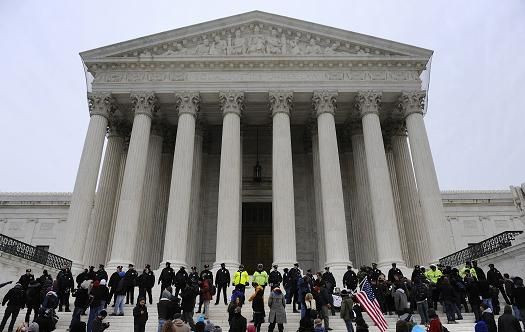Supreme Court AMP v. Myriad Case Preview: Can Human Genes Be Patented?

On its face, the question “can human genes be patented?” might seem simple. But a pending case in the U.S. Supreme Court illustrates the tangled Web that’s woven when legal and scientific issues intersect.
Sometime in June -- possibly this Monday [Update 6/10/2013 1:02pm: No opinion issued, could come on Thursday at the earliest] -- the U.S. Supreme Court is expected to issue a decision in Association for Molecular Pathology v. Myriad Genetics. The case arises from Myriad’s patents for the genes BRCA 1 and BRCA2, which form the basis of the company's breast cancer risk test (the one that prompted Angelina Jolie to get a double mastectomy). Myriad says that gene patents are a necessary tool to encourage companies to invest the vast sums needed for medical research. But plaintiff AMP, a scientific organization, argues that the existence of exclusive patents on human genes threatens medical research and testing. The larger question before the court is whether a human gene, even one significantly altered to be useful in a medical test, is a patentable invention.
“If you remove iron from rock, or a kidney from body, that resulting iron or kidney is not invention,” Sandra Park, a staff attorney for the American Civil Liberties Union, which is representing the plaintiffs, said in a phone interview. “We see these patents as an impediment to scientific freedom and research.”
Myriad’s argument centers on its position that the BRCA1 and BRCA2 genes that fall under its patent are a unique construction.
“The way that DNA exists in the body is as a 12-foot long molecule that’s totally worthless for diagnostic purposes,” Myriad spokesman Ron Rogers said in a phone interview. (Some scientific sources say the length of the human genome is 12 feet, while others say it's around 10 feet or 6.5 feet.) “What we believe we created are synthetic chemical molecules that do not exist in that form. What Myriad did was they went in, discovered the gene, isolated it, created probes and primers to read it and created a test. That all requires the handiwork of man.”
The plaintiffs say Myriads’ patents are stymieing research on breast cancer, which Myriad counters by citing the thousands of research articles published on BRCA1 and BRCA2. But Park doesn’t think the existing research is proof that the patents aren’t problematic.
“They get to define what they think is okay research and what is not,” Park says. “That’s what the patent gives them the power to do.”
The ACLU also argues that Myriad’s patents, and subsequent monopoly on testing, keep the breast cancer diagnostic test costs high. But the defense points to case studies showing that competition in diagnostic testing is no guarantee of keeping costs down. There are about 15 providers of the diagnostic test for Lynch syndrome, a kind of colorectal cancer, but the cost of that test is higher than the cost for Myriad’s BRACAnalysis.
As it mulls the issue, the high court has some previous decisions to draw upon. In 1980, the Court upheld the patentability of genetically modified bacteria in Diamond v. Chakrabarty, which paved the way for a biotech rush to patent all kinds of genes, including human genetic material. However, in its 2012 decision in Mayo Collaborative Services v. Prometheus Laboratories, the court said that inventions produced by the human body -- in that case, a method of measuring a drug’s effect on a patient -- were not eligible to be patented.
Dan Burk, a University of California, Irvine, law school professor and intellectual property attorney, thinks that the Myriad case is the third installment in a kind of legal trilogy. In 2010, the court affirmed strict limitations on patenting computer software in Bilski vs Kappos -- taking up the question of whether algorithms are patentable. In Mayo v. Prometheus, the court ruled on the patentability of a natural principle.
“Now we’re getting at the question of, ‘what are the limits of a natural product?’” Burk said in a phone interview. But he doesn’t expect the court to totally satisfy either side in the case. “Reading the tea leaves, my guess would be they’ll keep [the ruling] as narrow as they feel like they can.”
If the court does decide to overturn Myriad’s patents but does not include some very specific language keeping the decision confined, there could be ripple effects throughout the chemical and pharmaceutical industries. If unpatentable “natural products” are broadly defined, then a range of molecules and formulations could fall under that standard. Aspirin, for example (patented in 1900) is derived from a natural compound in willow bark.
In some ways, the Myriad case might seem moot -- the major BRCA patents start expiring in 2014, at which point other companies will be free to create their own BRCA tests. Plus, the fact that the human genome has been published could be a good argument against new patents on human genes filed since the Human Genome Project finished its work in the early 2000s.
But “there are lots of other critters on earth whose genome we know nothing about,” Burk says. “We don’t know what genes we might find in the rain forest, or at the bottom of the ocean.”
© Copyright IBTimes 2024. All rights reserved.





















